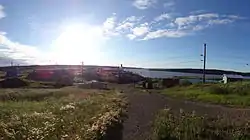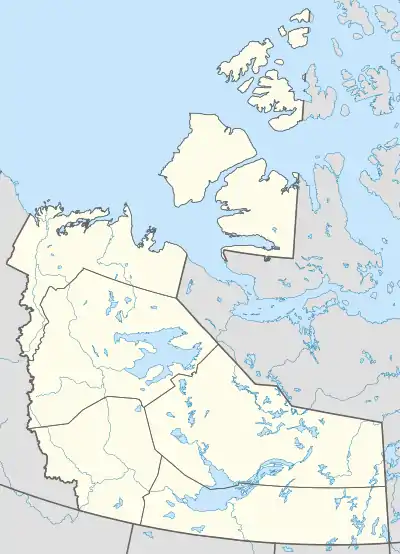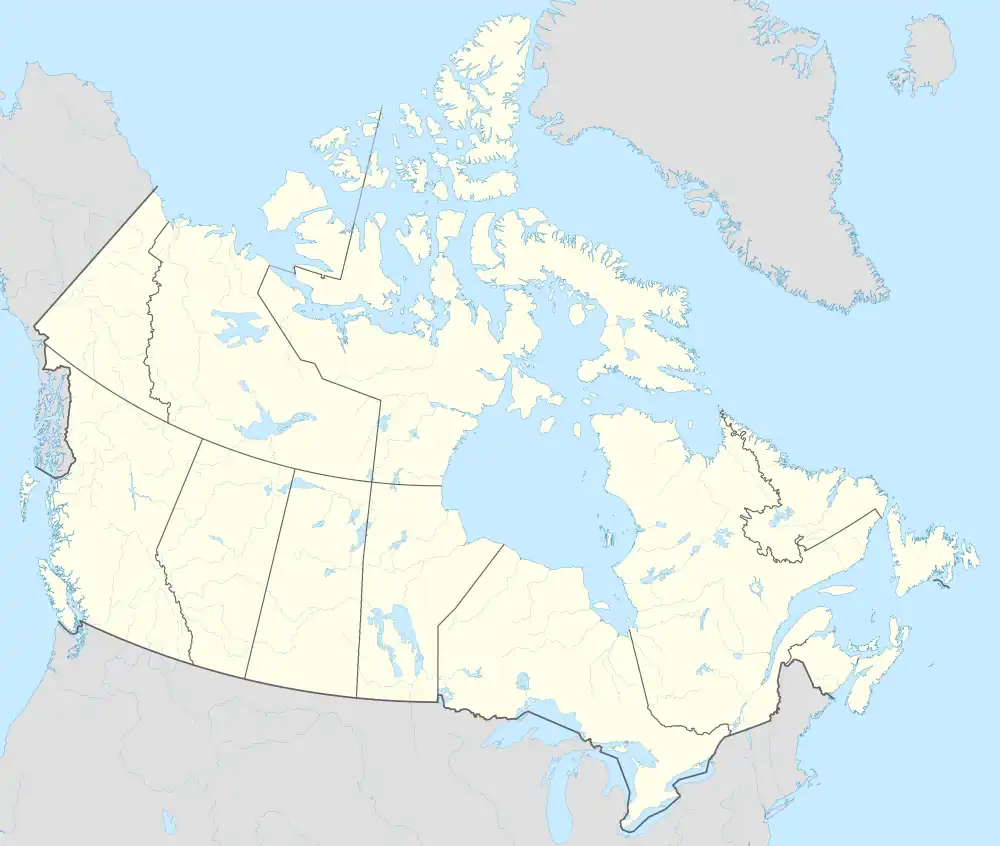Tsiigehtchic
Tsiigehtshik | |
|---|---|
Charter Community | |
| Charter Community of Tsiigehtchic | |
 The Church in Tsiigehtchic with the Arctic Red River and Mackenzie River in the background | |
 Tsiigehtchic  Tsiigehtchic | |
| Coordinates: 67°26′26″N 133°44′43″W / 67.44056°N 133.74528°W | |
| Country | Canada |
| Territory | Northwest Territories |
| Region | Inuvik Region |
| Constituency | Mackenzie Delta |
| Census division | Region 1 |
| Mission | 1868 |
| Charter Community | 21 June 1993 |
| Government | |
| • Chief | Phillip Blake |
| • Senior Administrative Officer | Jeff Mercier |
| • MLA | Frederick Blake Jr. |
| Area | |
| • Land | 48.98 km2 (18.91 sq mi) |
| Elevation | 6 m (20 ft) |
| Population (2011)[1] | |
| • Total | 172 |
| • Density | 3.5/km2 (9/sq mi) |
| Time zone | UTC−07:00 (MST) |
| • Summer (DST) | UTC−06:00 (MDT) |
| Canadian Postal code | X0E 0B0 |
| Area code | 867 |
| Telephone exchange | 953 |
| - Living cost | 167.5A |
| - Food price index | 170.3B |
| Sources:Department of Municipal and Community Affairs,[2] Prince of Wales Northern Heritage Centre,[3] Canada Flight Supplement[4] ^A 2013 figure based on Edmonton = 100[5] ^B 2015 figure based on Yellowknife = 100[5] | |
Tsiigehtchic (/ˈtsiːɡɛtʃɪk/ TSEE-getch-ik; "mouth of the iron river"), officially the Charter Community of Tsiigehtchic,[2] is a Gwich'in community located at the confluence of the Mackenzie and the Arctic Red Rivers, in the Inuvik Region of the Northwest Territories, Canada. The community was formerly known as Arctic Red River, until 1 April 1994. The Gwichya Gwich'in First Nation is located in Tsiigehtchic.
Demographics
|
| ||||||||||||||||||||||||||||||||||||||||||||||||||||||||||||||||||||||||
| Sources: NWT Bureau of Statistics (2001 - 2017)[14] | |||||||||||||||||||||||||||||||||||||||||||||||||||||||||||||||||||||||||
In the 2021 Census of Population conducted by Statistics Canada, Tsiigehtchic had a population of 138 living in 59 of its 73 total private dwellings, a change of -19.8% from its 2016 population of 172. With a land area of 47.89 km2 (18.49 sq mi), it had a population density of 2.9/km2 (7.5/sq mi) in 2021.[13]
In 2016, 130 people identified as First Nations and 10 as Inuit. However, only 5 people said that an Indigenous language (Gwich’in) was their mother tongue.[1]
Transportation
The Dempster Highway, NWT Highway 8, crosses the Mackenzie River at Tsiigehtchic.[15] During winter, vehicle traffic is over the ice, during the rest of the year, traffic is carried by the ferry MV Louis Cardinal.
The ferry stops at Tsiigehtchic, on the eastern bank of the Arctic Red River, and on the southwestern and northeastern banks of the Mackenzie River, connecting the two legs of the Dempster Highway. The community is one of the few in the NWT not to be served by a permanent airport.

Steppe bison carcass
In early September 2007, near Tsiigehtchic, local resident Shane Van Loon discovered a carcass of a steppe bison, which was radiocarbon dated to c. 13,650 cal BP.[16] This carcass appears to represent the first Pleistocene mummified soft tissue remains from the glaciated regions of northern Canada (Zazula et al. 2009).[16]
See also
References
- 1 2 3 4 "Population and dwelling counts, for Canada, provinces and territories, and census subdivisions (municipalities), 2016 and 2011 censuses – 100% data (Northwest Territories)". Statistics Canada. February 8, 2017. Retrieved February 1, 2022.
- 1 2 "NWT Communities - Tsiigehtchic". Government of the Northwest Territories: Department of Municipal and Community Affairs. Retrieved 2014-01-29.
- ↑ "Northwest Territories Official Community Names and Pronunciation Guide". Prince of Wales Northern Heritage Centre. Yellowknife: Education, Culture and Employment, Government of the Northwest Territories. Archived from the original on 2016-01-13. Retrieved 2016-01-13.
- ↑ Canada Flight Supplement. Effective 0901Z 16 July 2020 to 0901Z 10 September 2020.
- 1 2 Tsiigehtchic - Statistical Profile at the GNWT
- ↑ "1981 Census of Canada: Census subdivisions in decreasing population order" (PDF). Statistics Canada. May 1992. Retrieved February 1, 2021.
- ↑ "1986 Census: Population - Census Divisions and Census Subdivisions" (PDF). Statistics Canada. September 1987. Retrieved February 1, 2022.
- ↑ "91 Census: Census Divisions and Census Subdivisions - Population and Dwelling Counts" (PDF). Statistics Canada. April 1992. Retrieved February 1, 2022.
- ↑ "96 Census: A National Overview - Population and Dwelling Counts" (PDF). Statistics Canada. April 1997. Retrieved February 1, 2022.
- ↑ "Population and Dwelling Counts, for Canada, Provinces and Territories, and Census Subdivisions (Municipalities), 2001 and 1996 Censuses - 100% Data (Northwest Territories)". Statistics Canada. August 15, 2012. Retrieved February 1, 2022.
- ↑ "Population and dwelling counts, for Canada, provinces and territories, and census subdivisions (municipalities), 2006 and 2001 censuses - 100% data (Northwest Territories)". Statistics Canada. August 20, 2021. Retrieved February 1, 2022.
- ↑ "Population and dwelling counts, for Canada, provinces and territories, and census subdivisions (municipalities), 2011 and 2006 censuses (Northwest Territories)". Statistics Canada. July 25, 2021. Retrieved February 1, 2022.
- 1 2 "Population and dwelling counts: Canada, provinces and territories, and census subdivisions (municipalities), Northwest Territories". Statistics Canada. February 9, 2022. Retrieved February 18, 2022.
- ↑ Population Estimates By Community from the GNWT
- ↑ "Canadian Ferry Operators Association 2006 Annual Report". Canadian Ferry Operators Association. 2006. Archived from the original (PDF) on 2009-11-22.
- 1 2 Zazula, Grant D.; MacKay, Glen; Andrews, Thomas D.; et al. (December 2009). "A late Pleistocene steppe bison (Bison priscus) partial carcass from Tsiigehtchic, Northwest Territories, Canada". Quaternary Science Reviews. 28 (25–26): 2734–2742. doi:10.1016/j.quascirev.2009.06.012.
Further reading
- Heine, Michael K. Gwichya Gwich'in Googwandak: The History and Stories of the Gwichya Gwich'in ; As Told by the Elders of Tsiigehtchic. Tsiigehtchic, N.W.T.: Gwich'in Social and Cultural Institute, 2001. ISBN 1-896337-05-8
External links
- Tsiigehtchic at the Gwich'in Social and Cultural Institute